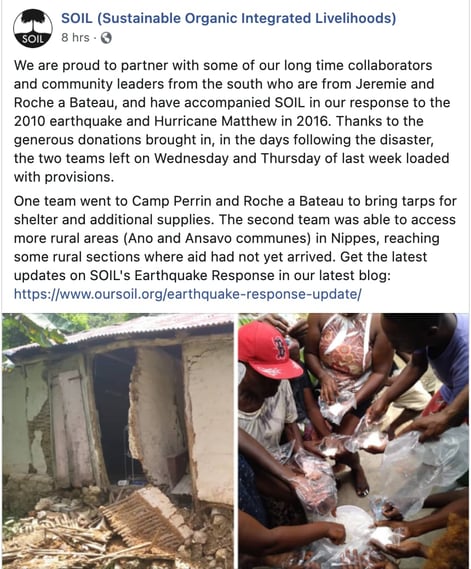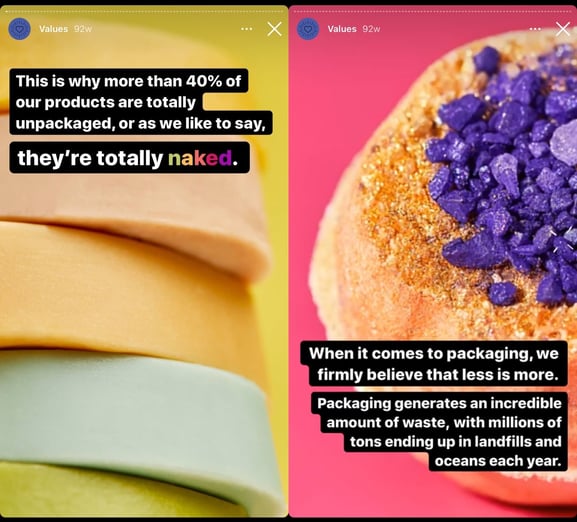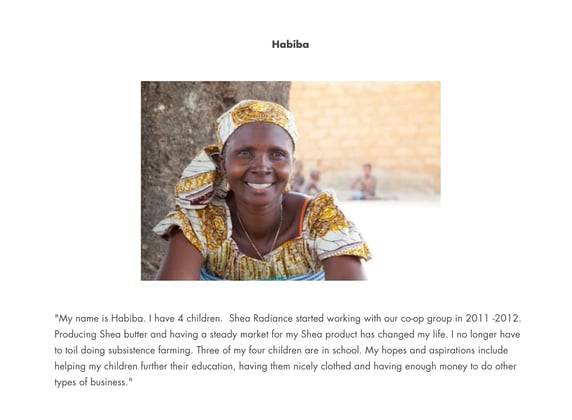Entrepreneurs used to be enterprising, savvy founders who started businesses for one reason: to make money. But times have changed — and with the emergence of something known as social entrepreneurship, several founders' motivations have shifted from profit margins to social responsibility.

Here, we'll review the concept of social entrepreneurship, get some perspective on what a socialpreneur is, take a look at some examples of successful social entrepreneurship ventures, go over some social entrepreneurship ideas, see how to pick a social entrepreneurship idea of your own, and check out some key statistics on the subject.
Let's dive in.
- What is social entrepreneurship?
- What is a socialpreneur?
- Social Entrepreneurship Examples
- Social Entrepreneurship Ideas
- How to Pick a Social Entrepreneurship Idea
- Social Entrepreneurs
- Social Entrepreneurship Statistics

What is social entrepreneurship?
The phrase 'social entrepreneurship' refers to a brand of entrepreneurship rooted in funding or implementing solutions to cultural, social, or environmental problems. The term is something of a catch-all that covers virtually any type of private organization that uses business as a means to socially conscious ends.
Social entrepreneurship is a relatively fluid concept that covers a broad variety of organizations. There's no definitive mold that says, "A socially entrepreneurial business generates X amount of revenue within the confines of a Y organizational structure for a Z type of cause."
For instance, both a mutual aid fund dedicated to assisting small businesses in marginalized communities and a corporation that uses its proceeds to support education for women in third-world countries could both be considered socially entrepreneurial outlets.
Some social enterprises might not follow any sort of typical organizational structure — they can be run entirely by volunteers who do not receive a paycheck or individual contributors that participate of their own accord.
What is a socialpreneur?
A socialpreneur is a person that sets out on an entrepreneurial venture with the intention of addressing social issues and contributing to the social good. These businesses can have a for-profit, non-profit, or hybrid model, but funds are typically used to support operational costs and develop programs to support target markets.
While socialpreneurs still abide by most core tenets as conventional entrepreneurs, there are key differences between the two groups.
Socialpreneur vs. Entrepreneur
The most significant difference between a socialpreneur and an entrepreneur is the end goal. The former is less interested in defining their successes through high profit margins. Instead, they're guided by how their operations benefit their causes and communities of interest.
While social entrepreneurs typically engage in standalone ventures, entrepreneurs can start for-profit businesses that fund programs to support social issues.
Let’s go over some real-life examples of small business social entrepreneurship, as well as larger enterprise businesses that engage in social ventures.
Social Entrepreneurship Examples
- TranSanta
- Books to Prisoners
- Cracked It
- 734 Coffee
- Belu
- Tranquiliti
- Surfrider Foundation
- SOIL
- TOMS
- Ben & Jerry's
- Warby Parker
- Good Eggs
- Lush
- Uncommon Goods
- GoldieBlox
- Pipeline Angels
- United By Blue
- Shea Radiance
- Werk
- Oliberté
- LSTN Sound Co.
- FIGS
- Love Your Melon
- Helpsy
- Cape Clasp
- Better World Books
Some businesses are founded for and dedicated to contributing to social good, and we’ll discuss some of them below.
1. TranSanta
TranSanta is a unique, community-led social entrepreneurship venture. It runs an Instagram account that features and highlights stories from transgender youth in need.
These individuals create Target wish lists of items that they need — and interested community members can anonymously purchase and send them what they need.
2. Books to Prisoners
Books to Prisoners is a traditional non-profit organization — operating out of Seattle, Washington — that helps tackle the issue of prison recidivism in the United States.
The organization accepts book donations from both community members and established bookstores to be repackaged and sent to incarcerated individuals — promoting education and literacy in the interest of making prisoners' transitions back into society simpler and more seamless after they're released.
The program also accepts monetary donations to support operational costs — including rent for office space, packaging for books, and shipping costs.
3. Cracked It
This London-based smartphone repair service is staffed by "at risk" and formerly incarcerated youth. The organization teaches life skills and provides income and employment opportunities for these disadvantaged and typically discriminated-against community members.
🚀LAUNCHING REPAIR RESCUE! 📱
— Cracked It (@CrackedIt) June 11, 2020
Same-day phone and tablet repairs without having to move a muscle!
📦We collect
🔧We fix
🚚We return
💙We support young people
Book now: https://t.co/WpQOSwUNfD
#blackownedbusinesses pic.twitter.com/J4WxOvuhmY
4. 734 Coffee
734 Coffee is a social venture dedicated to supporting Sudanese refugees. The business works with local co-op farms in Gambella to grow and harvest coffee. It then sells its products to U.S. retailers and allocates a portion of its profits to fund scholarships for Sudanese refugees.
5. Belu
Belu is a British, environmentally conscious organization that sources and provides water to hotels, restaurants, and catering businesses with a minimal carbon footprint. 100% of its net profits are donated to WaterAid — a business that provides clean water solutions to underserved communities.
6. Tranquiliti
Tranquiliti is an organization dedicated to improving, supporting, and promoting the mental well-being of young people in The United Kingdom. Since 2018, the organization has worked with teachers, students, and mental health professionals to provide mental health services in schools.
The organization aims to improve students' psychological well-being and educational performance by creating positive, supportive learning environments.
7. Surfrider Foundation
Surfrider Foundation is a volunteer and activist-driven organization dedicated to environmental stewardship — backed by chapters and communities across the United States. The program supports campaigns to raise awareness for issues like pollution, marine life protection, clean water, and coastal preservation.
8. SOIL
Sustainable, Organic, Integrated Livelihoods (or SOIL) is a nonprofit research and development organization that works to implement sustainable, low-cost solutions to the sanitation crisis in Haiti.
The organization supports community employment by staffing locally, and it donates 92% of every dollar it receives to support and enact its environmental improvement efforts.
9. TOMS
TOMS might be the world's preeminent social entrepreneurial outlet — in a lot of ways, it put the concept on the map. The company started on a one-for-one model: A consumer would buy a pair of shoes, and TOMS would give a pair to a child in need.
But the business has evolved since its inception. Now, buying a pair of TOMS shoes or sunglasses helps provide shoes, sight, water, safe birth, and bullying prevention services to people around the world.
#WellnessWednesday Samuel Woo, 66, has had borderline glaucoma for years & was unable to get new glasses. He discovered that if he got glasses from Venice Family Clinic, the frames would be free, thanks to a donation last year of 3,700 pairs from @TOMS. 😎👏 #HealthVisionMonth pic.twitter.com/PZXhRyARy7
— Venice Family Clinic (@VeniceFamClinic) May 26, 2021
10. Ben & Jerry’s
Most people know Ben & Jerry's for its elaborate ice cream, but there's much more to the organization than its product. The business is also dedicated to using profits for good.
The company's stated mission is "to create linked prosperity for everyone who's connected to our business — suppliers, employees, farmers, franchises, customers, and neighbors alike."
The business proactively promotes social progress — whether that be by supporting environmentally friendly farming and manufacturing, racial justice, LGBTQ+ issues, or a host of other causes.
For example, Ben & Jerry's ice cream is priced significantly higher than other brands, but that model isn't strictly for increasing profit margins — that extra revenue supports the company's ability to pay its workers a livable wage.
11. Warby Parker
Warby Parker is an American prescription glasses, sunglass, and contact lens retailer. The business employed a "Buy a Pair, Give a Pair" program — similar to TOMS' model. By 2019, the company had donated over 5 million pairs of glasses to underserved communities.
12. Good Eggs
Good Eggs is an online grocery and meal kit delivery service that sets itself apart by stocking its kits with fresh, local produce. Its mission is to ensure that over 70% of its food, wine, and spirits are locally sourced — and every item must meet a strict list of sourcing standards.
All employees also have a stake in the business — promoting transparent business practices and reinforcing the company's commitment to the health and safety of the businesses and communities it works with.
13. Lush
Lush, a socially conscious British cosmetics retailer, cites environmental awareness and ethical consumerism as its priorities. Those principles are the bedrocks for how it operates — from its packaging to its charitable endeavors.
All Lush cosmetics are free of packaging, and the company gives millions to environmental causes each year.
14. Uncommon Goods
Uncommon Goods offers creatives a marketplace to independently sell products — all while considering the implications it might have on people and the planet.
The company makes a conscious effort to minimize its environmental impact and works with the artists who populate its marketplace to use sustainable or recycled materials when possible.
15. GoldieBlox
GoldieBlox is a multimedia company committed to disrupting what it refers to as "the pink aisle in toy stores" by using storytelling to make the Science, Technology, Engineering, and Mathematics (STEM) field fun and engaging for young women — a demographic that is systematically underrepresented and underserved in the industry.
They create toys, books, apps, videos, animations, and other merchandise to empower girls to build confident, empowered futures.
16. Pipeline Angels
In 2017, only 30% of U.S. angel investors were women and only 12% were minorities. Pipeline Angels aims to disrupt that statistic and commits to creating capital and investment opportunities for trans women, cis women, nonbinary, two-spirit, agender, and gender-nonconforming founders.
The organization runs a signature boot camp that educates investors, offers mentoring opportunities, and even hosts a pitch summit for entrepreneurs seeking funding.
The warmest, most joyous welcome to the spring graduates of our angel investing program, and, our VC-in-Residence program.
— Pipeline Angels (@PipelineAngels) March 23, 2021
This photo includes forty-five more reasons why we're so passionate about our mission--forty-five more sparks of inspiration that energise this work. pic.twitter.com/k3cCCP1O8J
17. United By Blue
This is not your ordinary outdoor apparel store, as United By Blue commits to removing one pound of trash from the world’s oceans and waterways per every product purchased. At the time of publication, they’ve removed over four million pounds of trash.
18. Shea Radiance
Co-founder Funlayo Alabi and her husband started making soap to solve their family’s dry skin problems. What started as an experiment to heal their sons’ eczema-prone skin morphed into a clean and effective product line for hair, skin, and body.
Alabi sources all Shea Butter directly from women-run cooperatives in West Africa, which ensures revenue ends up "in the hands of the women who have earned it."
19. Werk
Werk believes the future of work is not unchangeable, it’s adaptive to each employee’s skills, motivations, and needs. By helping people find their Flextype, Werk believes they can make work flexible for everyone.
Did you know?
— The Mom Project (@The_Mom_Project) June 28, 2021
Take a look the #ageism report done by @werk_labs here: https://t.co/GM1ou03jDZ pic.twitter.com/29hfzAAx90
20. Oliberté
In 2013, Oliberté became the world’s first Fair Trade Certified™ footwear manufacturing factory. The company is a sustainable brand supporting workers’ rights in sub-Saharan Africa.
It launched its own factory in 2012 and makes every pair of Oliberté shoes in Addis Ababa, Ethiopia — creating jobs and bolstering the local economy.
21. LSTN Sound Co.
LSTN Sound Co. is a speaker and headphone manufacturer that takes an approach to social entrepreneurship that fits its industry — the company has partnered with The Starkey Hearing Foundation and uses its proceeds from its sales to provide hearing aids to those in need.
22. FIGS
FIGS produces comfortable, high-quality, ethically sourced scrubs for healthcare professionals. The company also donates hundreds of thousands of scrubs to providers across more than 35 countries.
23. Love Your Melon
Apparel brand Love Your Melon supports and donates to nonprofit organizations dedicated to battling pediatric cancer. 50% of net profits from all products help to create therapeutic experiences and create charitable programming initiatives for families affected by childhood cancer.
24. Helpsy
Helpsy is an American textile collection company dedicated to addressing and minimizing the environmental implications of clothing waste. 95% of the clothing the company collects is reused, upcycled, or recycled — and ultimately distributed to thrift shops and second-hand markets around the world. Since the organization's inception, it has eliminated 320 million pounds of CO₂ emissions and saved 20 billion gallons of water.
25. Cape Clasp
Cape Clasp is a Massachusetts-based, mission-driven, affordable jewelry retailer that donates 15% of its profits to support marine life organizations. Since it was founded in 2013, the business has raised over $200,000 for the non-profit organizations it works with.
26. Better World Books
Better World Books is an online secondhand bookstore. Shoppers can purchase books at a significant discount, and a portion of the company's profit goes towards initiatives that promote equitable literacy.
Social Entrepreneurship Ideas
So, you want to do some good, but you’re not quite sure where to start? Here are a few social entrepreneurship ideas and some guidelines for how to develop an idea that's all your own:
1. Crowdfunding
Crowdfunding is a way for businesses to raise money for a cause, usually for equitable and socially conscious organizations, like non-profits. Small businesses can launch crowdfunding ventures independently, donate money afterward, or partner with specific groups before creating a campaign.
2. Baking for a cause
The idea behind "baking for a cause" is pretty self-explanatory — it means raising money to support socially responsible causes by selling baked goods.
This idea has a pretty low barrier of entry. You don't have to be a skilled baker to do it — if you can follow a recipe on the back of a box, you can bake for a cause.
All you have to do is pick your cause, communicate with a relevant organization, and start baking. While it might not move mountains, it's still a fun venture for young entrepreneurs to get some valuable charitable experience.
3. Conflict-Free or Fair Trade Goods
Selling conflict-free or fair-trade goods is a considerably less accessible, more complex venture than the previous one. It requires extensive business acumen and connections to relevant organizations to help with every stage of the process.
Still, all of that intricacy generally translates to a much wider-reaching impact than a lot of the other ideas listed here. If your business has the capacity to manufacture its product ethically and sustainably, you should at least consider trying this avenue.
4. Educational Travel
Educational travel involves having hands-on learning experiences that broaden perspectives and help people understand different world views. If you’re a social entrepreneur, educational travel is worth considering.
Understanding the various environmental, economic, and social circumstances in countries that contribute to your business allows you to create genuine connections and ethically structure your operations.
5. Employment Services
Assisting with employment services provides a solid avenue for aspiring socialpreneurs to give back. Providing help with resume writing, job training, mock interviews, or finding career opportunities allows you to impact meaningful, practical change in disadvantaged or marginalized communities.
6. Crafting for a Cause
Crafting for a cause is fundamentally similar to baking for a cause — it involves taking on creative DIY projects and selling the products that stem from them.
It involves very little overhead and doesn't necessarily have to be some massive-scale effort. You just have to put together unique crafts, distribute them through forums like Etsy, and donate the proceeds to a charity of your choice.
7. Microlending
Microlending is giving small loans to people or businesses that don’t have access to typical lending sources — individuals and outlets that might not have the credit, background, or resources to reliably procure loans.
This kind of social enterprise can impact meaningful systemic change by opening up economic opportunities for promising businesses and entrepreneurs to expand their operations, find their footing in their competitive landscapes, and ultimately give back to the communities they come from.
8. Sustainable Housing and Development
Sustainable housing and development rests on real estate developers' ability and commitment to using environmentally sound practices and materials to construct eco-friendly buildings.
While this social entrepreneurship idea can be more impactful than most, it's also tougher to breach than virtually all of the concepts listed here — as you probably have to have a significant industry footing, extensive resources, and considerable experience to pull it off.
Still, if you're involved with housing and development, you should at least consider making your efforts more sustainable — you have the potential to do a lot of good by making this kind of commitment.
9. Mentorship or Funding for Entrepreneurs in Developing Countries
A sound sales mentorship program can go a long way in supporting economic progress in developing countries. By working with aspiring entrepreneurs in parts of the world that lack the resources and guidance to support their learning and development, you can aid their individual career development and ability to ultimately give back to their communities.
Those contributions to both personal well-being and broader societal change make this social entrepreneurship idea particularly impactful.
10. Diversity and Inclusion Initiatives in the Classroom
Diversity and inclusion initiatives in the classroom use resources that represent all groups of people, helping students learn about people that may be different from them. This is a socially conscious venture as it helps people understand everyone for who they are and give people the respect they deserve.
11. A Cooperative Marketplace
Creating a cooperative marketplace can involve selling products crafted in a socially conscious and ethical manner in an attempt to not contribute to fast fashion, unethical working conditions, or environmentalism.
Although not an exhaustive list, the ideas above are worth considering. If you’re unsure what to pick, read on to discover how to decide on a venture that works best for your business.
How to Pick a Social Entrepreneurship Idea
Define your passions and areas of interest.
Do you firmly believe every child in America should have a pillow? Do you volunteer at a food pantry on the weekends? Are you an activist for certain local charities? Define what you’re passionate about and proceed to step two...
Identify existing market the gaps.
Once you know what you’re passionate about, it’s time to decide what the gaps are in existing products or services and determine how you can fill them.
If the food pantry you volunteer at can’t distribute fresh, donated fruits and vegetables before they spoil, think about how you could provide a service that makes it faster and easier to get fresh produce to the underserved communities in your area.
Identify your key strengths and skills.
Are you an excellent writer or a salesperson extraordinaire? List your strengths and skills, and define how they can serve your mission. This is also an excellent time to identify your weaknesses — so you know who to call upon for help.
Decide on a business model.
Being a social entrepreneur is not always the same as starting a nonprofit. Determine whether and how you’ll monetize your idea — and design a fitting business model.
Whether you’re interested in a cross-compensation model like TOMS and Warby Parker or complete stewardship like Books to Prisoners, it’s important to understand how your business will be structured.
If you’re still feeling stumped, don’t worry. Starting a business is a tedious, involved process, but there are various, successful social entrepreneurs that you can refer to as inspiration.
Social Entrepreneurs
1. Jazzmine Raine
Raine is the founder of Hara House, the first zero waste guest house in Bikaner, Rajasthan, India. The area is a tourist destination with a vibrant environmental scene.
Of the house’s profits, 20% go to helping local youth get involved in economic opportunities, social justice, and environmental education. The youth help run the guest house, tours, and a community center.
2. Muhammad Yunus
Yunus is the founder of Grameen Bank. This Bangladesh-based institution provides small loans to those living in poverty. 97% of their borrowers are women — and 97% of those women have paid back their loans.
The bank manages a net income of over $10 million, has 2,568 branches, and covers 93% of all villages in Bangladesh. Yunus' work has also earned him a Nobel Prize. See his Talks at Google session on “The New Economics of Zero Poverty” below.
3. Scott Harrison
Charity: water CEO and INBOUND speaker Scott Harrison founded his nonprofit to bring clean, safe drinking water to people in developing countries.
It tracks every dollar raised to the project it funds, and private donors cover its operating costs — so 100% of the money it raises can fund their water projects.
To date, it has funded 91,414 water projects, helped almost 15 million people get clean water, and work with local partners in 29 countries. Check out Harrison’s INBOUND 2018 keynote below.
4. Vava Angwenyi
Kenyan coffee entrepreneur Vava Angwenyi started with one small coffee bar in her town, but she was soon helping farmers improve the quality of their coffee, their brand, and their sales.
Soon, Vava Coffee was born. Angwenyi’s company now serves as an exporter, roaster, and consultative partner working with more than 30,000 smallholder farmers who earn 18% more by working with Vava.
Angwenyi’s first company has been so successful, it inspired her to start Gente Del Futuro, a cross-cultural coffee training program in Tanzania, Kenya, and Columbia. Hear more about Vava’s work in her recent presentation at the Re:co Symposium.
5. Durell Coleman
Coleman is the founder and CEO of DC Design, a social impact design firm putting design thinking to use, solving some of the world’s biggest problems. His firm has addressed challenges in the criminal justice and foster care systems in the United States.
It has also designed solutions for refugee camps, and the organization has worked with executives at global enterprise organizations like Sony, Oracle, and Santander.
6. Emily Kirsch
Kirsch started Powerhouse after working with solar startup Mosaic to put solar panels on houses in Oakland, California. Today, Powerhouse supports clean energy entrepreneurship through a network of energy-focused co-working spaces.
It also offers venture backing for early-stage energy startups. Powerhouse also facilitates a series of signature events, from the Suncode hackathon to Powerhouse Circle and even a monthly podcast called "Watt it Takes."
7. Tony Weaver Jr.
Weaver is the founder and CEO of Weird Enough Productions, a media company focused on creating stories that inspire positive media images of black men and other minority groups.
With every piece of content they create, they also produce a lesson plan for teachers to introduce media literacy to their students. Check out Weaver’s recent TEDx Talk below.
Now that we're well acquainted with the subject of social entrepreneurship, let's take a look at some key statistics that could shape how the concept evolves, going forward.
Social Entrepreneurship Statistics
According to a survey — conducted by HubSpot — of over 1,000 consumers:
- 45% say brands should do more when it comes to advocating for social issues
- Racial justice (52%), climate change (50%), and income inequality (43%) are the most important issues respondents want to see companies take a stance on.
- Ages 18-35 are more likely to purchase based on social issues and identity than older groups.
- All age groups are similarly more likely to purchase from companies reducing their environmental impact, making corporate donations, treating employees well, and to support small businesses.
- 56% say companies should donate a portion of their profits to charity
- 66% say they are more likely to purchase from a company that donates a portion of its profits to charity.
- 66% say companies should actively try to reduce their environmental impact
- 46% say they are more likely to purchase from a company that actively tries to reduce its environmental impact
Social Entrepreneurship Is Here To Stay
When we were researching our book, Inbound Organization: How to Build and Strengthen Your Company's Future Using Inbound Principles, my co-author Todd Hockenberry and I called out several examples of how social responsibility is an important component of having a competitive advantage in today’s marketplace.
In the age of heightened competition, social responsibility is a differentiating factor that allows many companies to appeal to specific buyer demographics. The idea of “Conscious Capitalism” gained mainstream attention when Whole Foods founder John Mackey published a book by the same name.
In addition, consumers — now more than ever — put their trust in brands that they believe are committed to taking action. For example, consumers are 80% more likely to trust a business that they believe is committed to solving societal issues, especially when it comes to racial justice.
So, if you’re still interested in becoming a social entrepreneur — you couldn’t pick a better time. Formulate your plan today and make the world a better place.














